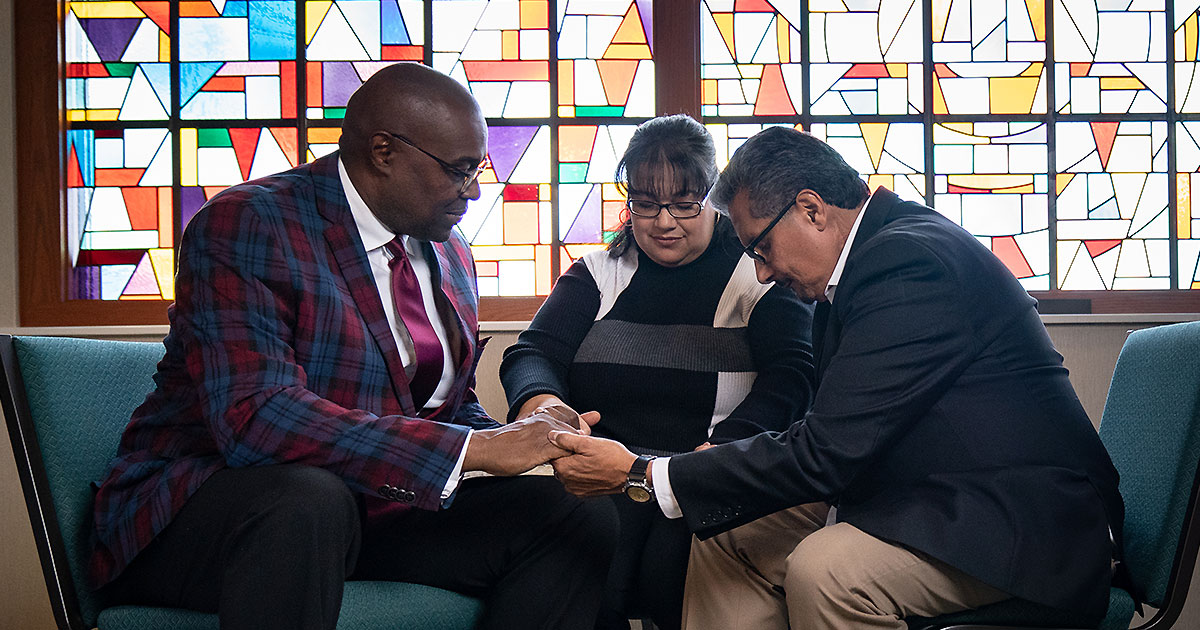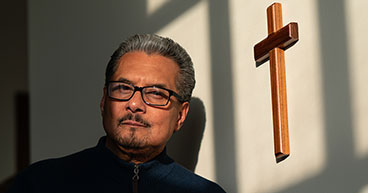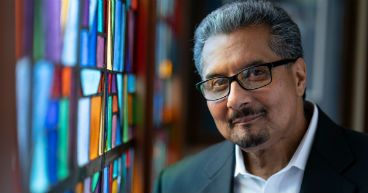
When you’re diagnosed with cancer, questions about your spirituality and self-worth may often flow like water from a spigot.
What did I do to deserve cancer?
Why is this happening to me?
Are my lifestyle choices to blame?
Why do I feel like I’ve lost my faith?
If you’ve asked yourself these or other “why me?” questions during your cancer journey, you’re not alone. According to the Journal of Pain and Symptom Management, one in four cancer patients struggle with questions about spirituality, including their relationship with God or other higher being. It’s even more common—one in two patients—among those diagnosed with advanced cancer.
Taking stock of your life and your beliefs during your cancer journey is normal. However, if you find that you’re stuck and unable to work through your questions, or anxiety about them is disrupting your life, you may be experiencing spiritual distress.
In this article, we’ll explore the role spirituality may play during a cancer journey. Topics include:
- What is spiritual distress?
- What is spirituality?
- Is spiritual health important?
- Where do you go to find spiritual help?
- Spiritual support at Cancer Treatment Centers of America® (CTCA)
If you’ve been diagnosed with cancer and want to learn more about spiritual support and other integrative care services at CTCA®, call us orchat online with a member of our team.
What is spiritual distress?
The two key signs of spiritual distress are:
- A loss of meaning in your life
- A breakdown in relationships with yourself, others, your faith or the world
The North American Nursing Diagnosis Association (NANDA) defines spiritual distress as the “impaired ability to experience and integrate meaning and purpose in life through connectedness with self, others, art, music, literature, nature, and/or power greater than oneself.”
Spiritual support is characterized by emotions that may include anger, feelings of shame, remorse or isolation, loss of hope or lack of purpose, so it may have a negative impact on your mental health and quality of life. Some patients have reported increased physical pain.
“Often spiritual distress is derived from being angry at God or even yourself,” says Carl Williamson, Manager of the Pastoral Care Department at CTCA Chicago. “If you let that anger grow in you, and let it become toxic, it may affect your thinking and your behavior. Spiritual distress may impair your ability to maintain relationships and practice good self-care and affect the decisions you make about your cancer treatment.”
High levels of spiritual distress may lead to physical stress that may contribute to poorer health and psychosocial outcomes, including anxiety and depression, according to the National Cancer Institute (NCI).
A person’s level of spiritual distress may be difficult to diagnose and should be accessed by a health care professional.
What is spirituality?
Spirituality may be faith-based, but it doesn’t have to be. Your spirit is simply the part of you that carries your beliefs and how you understand the world.
“Spirituality is generally recognized as encompassing experiential aspects, whether related to engaging in religious practices or acknowledging a general sense of peace and connectedness,” the NCI states. “The concept of spirituality is found in all cultures and is often considered to encompass a search for ultimate meaning through religion or other paths.”
Why is spiritual health important?
“Spiritual health gives many cancer patients the resolve they need to cope with and work through the physical and emotional rigors of a cancer journey,” says Percy McCray, Jr., Director of Faith-Based Programs at CTCA.
According to Rev. McCray, cancer patients struggling with spiritual issues may experience:
- Shame that specific lifestyle choices led to the cancer diagnosis, such as smoking or excessive drinking
- Loss of faith or fear that a cancer diagnosis is God’s punishment
- Feelings of separation or isolation from a spiritual community
- Feelings of isolation due to unresolved family issues and/or broken relationships
- Loss of belief in your life purpose
- Loss of hope
Cancer patients struggling spiritually may no longer find comfort in coping strategies that previously brought them inner peace, such as prayer or meditation. Those who don’t consider themselves spiritual or who haven’t developed healthy coping strategies risk turning to unhealthy behaviors, including drug or alcohol use, over- or under-eating, sleeping too much, or withdrawing from friends, family and activities.
Multiple studies have determined a positive correlation between the spiritual health and quality of life of cancer patients. Researchers working with breast, prostate and gynecologic cancer patients as well as those undergoing radiation and/or chemotherapy found those who rated high on spiritual health assessments were more likely to also rank high on mental health and quality of life.
Patients who rated high on spiritual health reported:
- Feelings of inner peace
- Connectedness to human life and the universe (existentialism)
- Awe when walking in nature
- A sense of faith
- A sense of connectedness to others or to God
“When we are closer to our spirituality, our spiritual roots, we have the nutrients–trust, faith, confidence, hope and love–that provide us with the ability to work through obstacles that come our way,” Williamson says.
Who do your ask for spiritual help?
Some hospitals have chaplains trained to give support to cancer patients of different faiths, as well as those who aren't religious. However, if you usually get your cancer treatment at home or at an outpatient care treatment center, you may not have regular access to a chaplain or spiritual advisor. Ask your health care team for help connecting with your hospital’s chaplain or local resources that may be available to you.
Some ways a chaplain may help you cope with spiritual distress include:
- Talking with you about your fears and concerns
- Helping you reconcile your relationship with God or others
- Giving spiritual guidance
- Providing spiritual readings, music or other resources
There are also many spiritual coping techniques you can try on your own. Some cancer patients say they’ve found inner peace and more meaning to life by practicing one or more of the following:
- Praying or meditating
- Reading uplifting or spiritual stories
- Talking with others who share similar experiences
- Taking time alone to reflect on life and relationships
- Writing in a journal
- Participating in creating art, woodworking or other hands-on activities
- Walking outside to connect and enjoy nature
- Spending time in a place where you find beauty
- Listening to soothing or spiritual music
- Taking part in community or social gatherings for support and to support others
Spiritual support at CTCA
Spiritual support plays a fundamental role in the cancer journey for many patients who undergo treatment at CTCA. At CTCA, the pastoral care team makes a point to reach across cultures, beliefs and religious backgrounds so that all patients, from any faith, may find the strength, motivation and inspiration they need during their cancer journey.
CTCA spiritual support services include:
- Individual and group prayer
- Counseling with a pastor, clergy member or representatives from multiple faiths, including Judaism, Islam, Jehovah’s Witnesses and others
- Weekly interfaith worship and communion services, as well as Bible studies at participating hospital locations
- Communication between our pastoral care team and your spiritual advisers at home, upon request
- Individual and group opportunities for spiritual support
- Telephone consultations
- Assistance in scheduling ceremonies, sacraments and spiritually significant observances
- Support and assistance in accommodating specific religious needs and restrictions, such as Kosher diets or beliefs that ban blood transfusions
Chaplains are available for prayer before surgery and can meet with caregivers and family members at any time. In addition, some clinicians, including physicians and nurses, may choose to pray with patients as part of the care they provide.
Spiritual support services also are available to you any time you choose, even after you have completed your treatment and returned home.
Chaplain Williamson explains that sometimes chaplains provide calming and peace to patients just by being present. “We help by leaning into patients’ spirituality and pointing them in the direction of their God or higher power. Spiritual counseling may help you find the courage to move forward in your cancer journey or, at the end of life, be at peace with letting go.”
Rev. McCray agrees.
“Spiritual support gives a level of control back to cancer patients in the midst of a situation in which so many things are not in their control,” he says. “You don’t need a physical place to access the empowering benefits of your own spirituality.”
If you’ve been diagnosed with cancer and want to learn more about spiritual support and other integrative care services at CTCA, call us orchat online with a member of our team.



